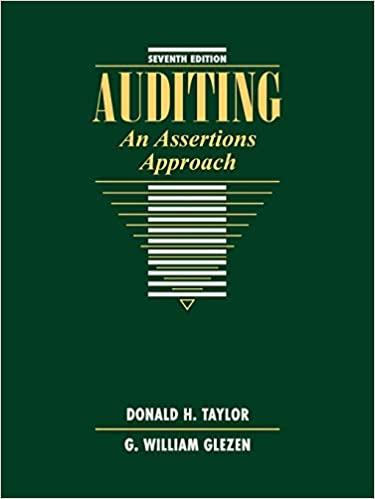Mr. Clyde Neglent, CPA, was engaged to perform an audit of Hidden Records, Inc., a retail department
Question:
Mr. Clyde Neglent, CPA, was engaged to perform an audit of Hidden Records, Inc., a retail department store. Mr. Neglent had investigated the business and its owners before accepting the engagement and had found that Hidden Records, Inc., securities were popular, particularly during the last two years when total assets had risen by 20 percent and earnings by 15 percent. The company appeared to have the characteristics of a solid commercial establishment. But one thing bothered Mr. Neglent. The president and other key officers had unstable records of employment. In addition, Mr. Neglent was puzzled by the sudden rise in profits during a period when retail sales in that region of the country had dropped. Nevertheless, the audit was accepted and work soon commenced.
The company kept most of its records on computer files. The accounts receivable were maintained on magnetic disk. Mr. Neglent's knowledge of computer systems was minimal (another reason for his hesitation in accepting the engagement). Therefore, he decided to consult with the company's data processing manager to determine the best way to audit the records stored in computer files.
Ms. Clev, the data processing manager, made several suggestions on the various techniques that could be used to extract audit evidence. Most of them involved printouts of information stored in the computer. These suggestions all appeared to be reasonable and were followed by Mr. Neglent.
Mr. Neglent wished to send confirmation letters to a sample of the customers whose accounts made up the accounts receivable balance, because this amount represented approximately 20 percent of the total assets. Ms. Clev stated that she had a sampling plan that she used when it was necessary to select customer accounts randomly for various reasons. She offered to make the sample selection for Mr. Neglent and to print confirmation requests. These requests would be given to Mr. Neglent, who, in turn, would mail them to the customers. Mr. Neglent agreed, and this procedure was followed. Replies received from the customers indicated that the account balances were correct.
All other phases of the audit went smoothly, and the audit report was issued with an unqualified opinion. Several months later, Hidden Records, Inc., declared bankruptcy. The company had inflated its earnings and assets by creating false sales and accounts receivable.
Required:
Answer the following questions.
a. Would third parties who relied on the financial statements and invested in the company's securities be able to successfully sue the auditor for ordinary negligence under the assumption that the investors constituted foreseen parties? Give reasons for your answer.
b. Would third-party investors qualify as foreseeable parties? Give reasons for your answer.
c. Would the investors be able to prove scienter and successfully sue the auditor? Give reasons for your answer.
d. Name any auditing standards violated by the auditor. Give reasons for your answers.
e. All things considered, in what ways should the auditor have acted differently in this audit?
Step by Step Answer:

Auditing An Assertions Approach
ISBN: 9780471134213
7th Edition
Authors: G. William Glezen, Donald H. Taylor





